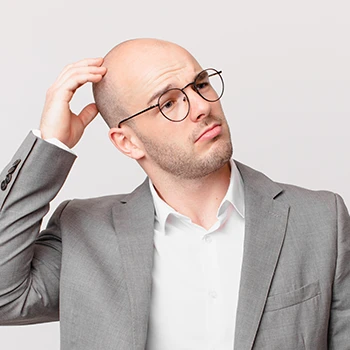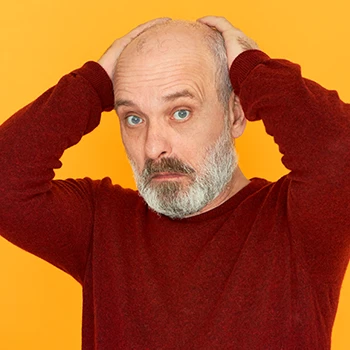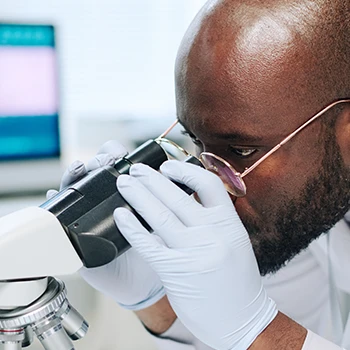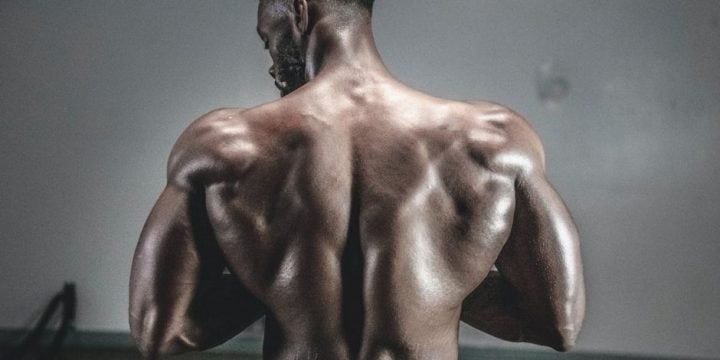Male pattern hair loss, common in men over 50 and sometimes younger, is often attributed to higher testosterone levels. However, the link between testosterone and hair growth is not straightforward.
As a health optimization coach (and someone afraid of hair loss), I needed to research it.
So, I spent a day researching the subject and discussed the literature with an endocrinologist to see if scientific studies on testosterone levels could really explain hair loss.
Quick Summary
- Baldness in men is more closely linked to genetics and hair follicle sensitivity to dihydrotestosterone (DHT), rather than high testosterone levels alone.
- Men with more body hair are more likely to have higher testosterone levels, but this does not directly correlate with baldness.
- According to a 2017 meta-analysis involving 10,846 cases and 11,672 controls published in the Natural Communication journal, approximately 39% of male pattern baldness is explained by 63 genetic loci.
- In my opinion, focusing on overall health and potentially exploring the best T-boosters for men is more important than worrying about hair loss and testosterone levels, as both bald and non-bald men can have varying testosterone levels.
Does Balding Mean You Have High Testosterone?

No, balding doesn’t mean you have high testosterone, and the myth could be as old as the ancient Greeks [1].
A similar theory also came up in the 20th century.
The whole idea was that castrated men don’t produce any testosterone, and therefore, if they didn’t go bald, then it had to be testosterone that influenced the hair follicles.
But how much testosterone you have or don’t have doesn’t dictate whether or not you will go bald earlier or later in life.
What affects bald men has much more to do with genetics than testosterone levels.
Let me explain.
Impact of Genetics and Testosterone on Hair Follicles

According to the Natural Communication journal 2017 meta-analysis involving 10,846 cases and 11,672 controls, the impact of certain genetic markers determines the strength of hair follicles and, ultimately, hair loss [2]. It showed that 39% of male pattern baldness is explained by 63 genetic loci.
T-levels influence hair loss, but the amount of testosterone is not the sole determinant of hair loss onset or rate.
Some enzymes transform testosterone into a more active form, directly shrinking hair follicles.
Dozens of genes influence how receptive follicles are to this process.
More on this process later.
So, what does testosterone do in men? Men with both high and low T-levels could have the type of genes that make them more susceptible to balding.
While burly bald men might find it easier to attract female sexual partners, it’s not their testosterone that’s doing it.
Related Articles:
The Hair Loss Myth
There are probably more medical myths around what’s happening to bald men than any other aging effect.
And unfortunately, one reason I believe these myths are still circulating comes down to the lucrative industry of hair loss treatments.
Overly simplistic ideas going back to the ancient Greeks might be a convenient way to do your marketing. But it’s not the way to approach scientific research.
Many bald men jump on the idea of sex hormones to grow more hair and buy into the concept of hormone creams and pills.
Are There Other Hormones Linked to Male Pattern Baldness?

Dihydrotestosterone (DHT), a male sex hormone responsible for developing male traits, is closely linked to male pattern baldness.
The endocrinologist who helped me with the research for this post also pointed me to some research on alopecia in men.
The research from Medline Plus has shown that baldness in men can be linked to dihydrotestosterone (DHT), a more potent androgen responsible for developing male traits [3].
As mentioned before, this form is basically an offshoot of testosterone, as it is a result of its conversion through an enzyme called 5-alpha-reductase [4].
"Excess androgens, or male sex hormones, and hormonal imbalances are the most common cause of hair loss, such as androgenetic alopecia."
-Michele Green, M.D., Cosmetic Dermatologist
So, it’s partly true that hormones can influence the growth of new hairs, but not in the way that most people believe.
It’s also important to note that for medical conditions like alopecia, there may be good reasons to opt for hair loss treatment. But that’s something you should discuss with a doctor.
Genetic Research on Baldness and Testosterone
A 2001 genetic study published in the Journal of Investigative Dermatology has shown that baldness is more related to a person's genetic makeup than to high testosterone levels alone [5].
This is supported by the discovery that the ratio of testosterone to epitestosterone is, on average, 46.41 in men who are bald and 35.83 in men who are not bald, indicating a significant link between genetics and male pattern baldness.
"Male pattern baldness, or gradual thinning of hair on the scalp, is typically hereditary. It happens as hormone levels change over a man’s lifetime, particularly starting in middle age."
- Ben Friedman, M.D., Dermatologist
Genes that influence male pattern baldness can make hair follicles more sensitive to dihydrotestosterone (DHT), a derivative of testosterone.
This increased sensitivity can lead to the miniaturization of follicles and, eventually, hair loss.
FAQs
Do Guys With More Body Hair Have More Testosterone?
Yes, guys with more body hair often have more testosterone. It’s the changes in the sex hormone levels during puberty that result in body and facial hair growth, and the same processes continue with age.
How Do You Know if a Guy Has High Testosterone?
You might know that a guy has high testosterone if they have rapidly bulked up, developed oily skin, or had acne with possible mood swings. These are, of course, just common symptoms, not a bulletproof way to assess anyone's hormonal status. But it’s not true that bald men always have a higher T-count and that this causes hair loss.
References:
- https://onlinelibrary.wiley.com/doi/full/10.1111/exd.12702
- https://pubmed.ncbi.nlm.nih.gov/28272467/
- https://medlineplus.gov/genetics/condition/androgenetic-alopecia/
- https://www.ncbi.nlm.nih.gov/pmc/articles/PMC6264586/
About The Author
You May Also Like






